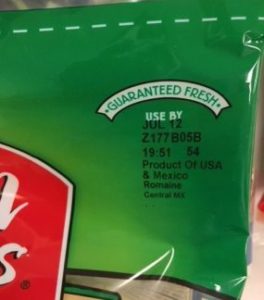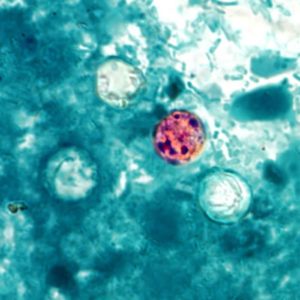 Products were sold in many states under either the brand name Fresh Express or the store brand labels ALDI Little Salad Bar, Giant Eagle, Hy-Vee, Jewel-Osco Signature Farms, ShopRite Wholesome Pantry, and Walmart Marketside.
Products were sold in many states under either the brand name Fresh Express or the store brand labels ALDI Little Salad Bar, Giant Eagle, Hy-Vee, Jewel-Osco Signature Farms, ShopRite Wholesome Pantry, and Walmart Marketside.
Since the last case count update on July 9, 2020, 132 new laboratory-confirmed Cyclospora infections have been reported, including 16 from three new states: Georgia, Pennsylvania, and South Dakota.
As of July 22, 2020, a total of 641 people with laboratory-confirmed Cyclospora infections associated with this outbreak have been reported from 11 states: Georgia (1), Illinois (198), Iowa (195), Kansas (5), Minnesota (73), Missouri (57) Nebraska (55), North Dakota (6), Pennsylvania (2), South Dakota (13) and Wisconsin (36). The ill person from Georgia purchased and ate a bagged salad product while traveling in Missouri.
Illnesses started on dates ranging from May 11, 2020 to July 5, 2020. Ill people range in age from 10 to 92 years with a median age of 59 and 52% are female. Of 636 people with available information, 37 people (6%) have been hospitalized. No deaths have been reported.
As of July 8, 2020, there are 37 confirmed cases of Cyclospora illness linked to this outbreak in three provinces: Ontario (26), Quebec (10) and Newfoundland and Labrador (1). Individuals became sick between mid-May and mid-June 2020. One individual has been hospitalized. No deaths have been reported. Individuals who became ill are between 21 and 70 years of age. The majority of cases (76%) are female.
 Products were sold in many states under either the brand name Fresh Express or the store brand labels ALDI Little Salad Bar, Giant Eagle, Hy-Vee, Jewel-Osco Signature Farms, ShopRite Wholesome Pantry, and Walmart Marketside.
Products were sold in many states under either the brand name Fresh Express or the store brand labels ALDI Little Salad Bar, Giant Eagle, Hy-Vee, Jewel-Osco Signature Farms, ShopRite Wholesome Pantry, and Walmart Marketside.
You can identify the recalled products by looking for the Product Code, located in the upper right-hand corner of the front of the package.
The recall includes products marked with the letter “Z” at the beginning of the Product Code, followed by the number “178” or lower.
What is Cyclospora?
Cyclospora is a parasite composed of one cell, too small to be seen without a microscope. The organism was previously thought to be a blue-green alga or a large form of cryptosporidium. Cyclospora cayetanensis is the only species of this organism found in humans. The first known human cases of illness caused by Cyclospora infection (that is, cyclosporiasis) were first discovered in 1977. An increase in the number of cases being reported began in the mid-1980s, in part due to the availability of better diagnostic techniques. Over 15,000 cases are estimated to occur in the United States each year. The first recorded Cyclospora outbreak in North America occurred in 1990 and was linked to contaminated water. Since then, several cyclosporiasis outbreaks have been reported in the U.S. and Canada, many associated with eating fresh fruits or vegetables. In some developing countries, cyclosporiasis is common among the population and travelers to those areas have become infected as well.
 Where does Cyclospora come from?
Where does Cyclospora come from?
Cyclospora is spread when people ingest water or food contaminated with infected stool. For example, exposure to contaminated water among farm workers may have been the original source of the parasite in raspberry-associated outbreaks in North America. Cyclospora needs time (one to several weeks) after being passed in a bowel movement to become infectious. Therefore, it is unlikely that Cyclospora is passed directly from one person to another. It is not known whether or not animals can be infected and pass infection to people.
What are the typical symptoms of Cyclospora infection?
Cyclospora infects the small intestine (bowel) and usually causes watery diarrhea, bloating, increased gas, stomach cramps, loss of appetite, nausea, low-grade fever, and fatigue. In some cases, vomiting, explosive diarrhea, muscle aches, and substantial weight loss can occur. Some people who are infected with Cyclospora do not have any symptoms. Symptoms generally appear about a week after infection. If not treated, the illness may last from a few days up to six weeks. Symptoms may also recur one or more times. In addition, people who have previously been infected with Cyclospora can become infected again.
What are the serious and long-term risks of Cyclospora infection?
Cyclospora has been associated with a variety of chronic complications such as Guillain-Barre syndrome, reactive arthritis or Reiter’s syndrome, biliary disease, and acalculous cholecystitis. Since Cyclospora infections tend to respond to the appropriate treatment, complications are more likely to occur in individuals who are not treated or not treated promptly. Extraintestinal infection also appears to occur more commonly in individuals with a compromised immune system.
How is Cyclospora infection detected?
Your health care provider may ask you to submit stool specimen for analysis. Because testing for Cyclospora infection can be difficult, you may be asked to submit several stool specimens over several days. Identification of this parasite in stool requires special laboratory tests that are not routinely done. Therefore, your health care provider should specifically request testing for Cyclospora if it is suspected. Your health care provider might have your stool checked for other organisms that can cause similar symptoms.
How is Cyclospora infection treated?
The recommended treatment for infection with Cyclospora is a combination of two antibiotics, trimethoprim-sulfamethoxazole, also known as Bactrim, Septra, or Cotrim. People who have diarrhea should rest and drink plenty of fluids. No alternative drugs have been identified yet for people with Cyclospora infection who are unable to take sulfa drugs. Some experimental studies, however, have suggested that ciprofloxacin or nitazoxanide may be effective, although to a lesser degree than trimethoprim-sulfamethoxazole. See your health care provider to discuss alternative treatment options.
How can Cyclospora infection be prevented?
Avoiding water or food that may be contaminated is advisable when traveling. Drinking bottled or boiled water and avoiding fresh ready-to-eat produce should help to reduce the risk of infection in regions with high rates of infection. Improving sanitary conditions in developing regions with poor environmental and economic conditions is likely to help to reduce exposure. Washing fresh fruits and vegetables at home may help to remove some of the organisms, but Cyclospora may remain on produce even after washing.
Marler Clark, The Food Safety Law Firm, is the nation’s leading law firm representing victims of Cyclospora outbreaks. The Cyclospora Attorneys and Lawyers have represented victims of Cyclospora and other foodborne illness outbreaks and have recovered over $750 million for clients. Marler Clark is the only law firm in the nation with a practice focused exclusively on foodborne illness litigation.
If you or a family member became ill with a Cyclospora infection after consuming food and you are interested in pursuing a legal claim, contact the Marler Clark Cyclospora attorneys for a free case evaluation.